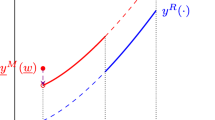Abstract
In a one-good world, there is a nice correspondence between the Pigou-Dalton principle of transfer and social welfare dominance. In this paper we study the case of multiple goods (without using prices as a means to come back to one dimension), and show that many results of the one-dimensional setting carry over to the multidimensional case when individuals are assumed to have identical preferences. But the nice correspondence breaks down as soon as individual preferences display minimal differences, and multidimensional versions of the transfer principle clash with the Pareto principle. This analysis reveals an interesting connection with the theory of fair allocation, since multidimensional transfer principles are closely related to the no-domination criterion, a weak version of the no-envy criterion.
Similar content being viewed by others
Author information
Authors and Affiliations
Corresponding author
Additional information
For helpful comments, we thank J. L. Castillo, M. Le Breton, Y. Sprumont, K. Suzumura and participants at a workshop in Osnabrück, a LivinTax conference in Bordeaux and a seminar in Hitotsubashi University, as well as two referees. Financial support from TMR project Living Standards, Inequality and Taxation Contract no ERBFMXCT 980248 of the European Commission is gratefully acknowledged. We thank Michel Le Breton for giving us the permission to state a result contained in his unpublished Ph D thesis.
Rights and permissions
About this article
Cite this article
Fleurbaey, M., Trannoy, A. The impossibility of a Paretian egalitarian. Soc Choice Welfare 21, 243–263 (2003). https://doi.org/10.1007/s00355-003-0258-2
Issue Date:
DOI: https://doi.org/10.1007/s00355-003-0258-2




